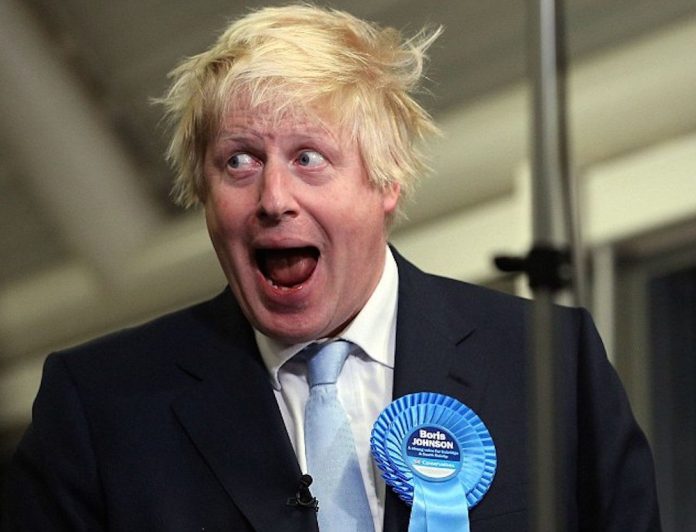The prime minister used his Sunday evening video to contradict former Tory PM Margaret Thatcher and her famous statement that there was “no such thing as society”.
Closing the video, Mr Johnson said: “One thing I think the coronavirus crisis has already proved is that there really is such a thing as society.”
In the two-and-a-half minute message, the prime minister paid tribute to former NHS staff who were returning during the coronavirus outbreak.
“Just this evening I can tell you we have 20,000 NHS staff coming back to the colours – doctors and nurses – it’s a most amazing thing.”
He also thanked the 750,000 civilian volunteers who have come forward to help during the crisis, and pharmacists for “not only dispensing vital medicines but also, very often, reassurance to the customers they interact with”.
It came after England’s deputy chief medical officer warned it could be six months or more before the UK gets back to normal from the pandemic.
At the daily Downing Street briefing, Dr Jenny Harries said lockdown measures could be in place for months and would be lifted gradually before regular life resumes fully.
She said the nationwide restrictions would be reviewed every three weeks.
Dr Harries said: “Three weeks for review, two or three months to see if we’ve really squashed it, but three to six months, ideally…
“This is not to say we would be in complete lockdown for six months, but as a nation we have to be really, really responsible and keep doing what we’re all doing until we’re sure we can gradually start lifting various interventions which are likely to be spaced – based on the science and our data – until we gradually come back to a normal way of living.”
Dr Harries also cautioned that patience is needed before the lockdown, which has only fully been in place for a week, has an impact on the number of new infections.
“It would be foolish of us to start something one day and assume it’s going to have an impact the next,” she said.
On Sunday, it was confirmed that another 207 people in the UK have died after testing positive for coronavirus – taking the total to 1,235.
Dr Harries said the next two to three weeks would be especially crucial for seeing whether the lockdown measures have been effective, and she warned that the death rate is expected to increase “for the next week or two”.
The deputy chief medical officer added: “We will not have succeeded until we get right to the end of this outbreak.”
Elsewhere in the news conference, Housing, Communities and Local Government Secretary Robert Jenrick warned additional lockdown measures could be enforced if current restrictions are deemed to be insufficient, or if Britons fail to comply with them.
He announced that strategic co-ordination centres are being established across the country that will be led by gold commanders – bringing together senior members of the emergency services with local authorities and the NHS.
Mr Jenrick said teams are working “around the clock” to deliver equipment to frontline NHS staff – with 170 million masks, 42.8 million gloves and 2.3 million pairs of eye protectors delivered to 58,000 healthcare facilities so far.
He also addressed an estimated one million vulnerable people who are being asked to stay at home for 12 weeks because they have underlying health conditions.
The MP said the NHS will deliver medicines to those who don’t have friends, family or neighbours to rely on – and that, by the end of this week, 50,000 parcels containing cereal, tinned goods and other essentials will have been sent to the most vulnerable.
Production is being ramped up on these care packages, and Mr Jenrick said the government is prepared “to send out as many as required for as long as it takes”.
Earlier, Cabinet Office minister Michael Gove told Sky News that the length of the lockdown is not fixed but depends on the behaviour of the public.
Speaking to Sophy Ridge On Sunday, he refused to give a time limit for the restrictions – but said the period could be shortened if people follow the government’s guidelines.
“There are different projections as to how long the lockdown might last. But it’s not the case that the length of the lockdown is something that is absolutely fixed,” he added.
Mr Gove later said the public must prepare for “a significant period” of lockdown in a separate interview to the BBC.
Former chief scientific adviser Sir Mark Walport echoed the importance of social distancing measures, telling Sophy Ridge On Sunday: “The science advice is actually absolutely rock solid worldwide – that the best way out of this is to keep people apart from each other, which is why the advice of stay at home is so critically important.
“In other words, the one thing we know is that you need to reduce the number of people that one infected person infects on average, which is about three, for this virus, we think, down to below one. And the only way you do that is by separating people.”
In a letter to be sent to every household in the UK next week, the prime minister warns that “things will get worse before they get better”.
Referencing the current “national emergency”, Boris Johnson says: “It is with that great British spirit that we will beat the coronavirus and we will beat it together.”
The prime minister is currently self-isolating in his Westminster flat after testing positive for COVID-19. He is understood to be experiencing only mild symptoms and is working from home.
Health Secretary Matt Hancock and Scottish Secretary Alister Jack are also in self-isolation with COVID-19 symptoms.
NHS England’s national medical director Professor Stephen Powis said earlier this month it would be a “good result” if the toll in the UK was less than 20,000.







